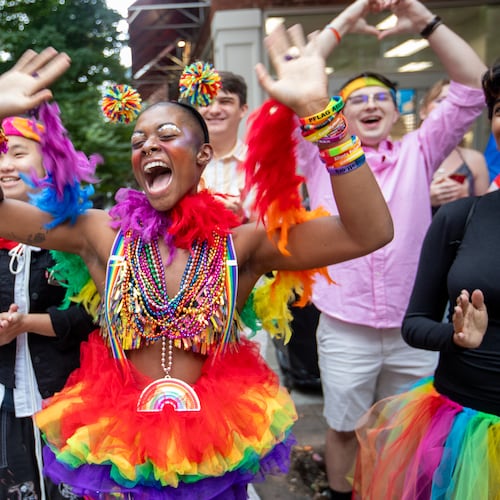After a one-year hiatus and two years of COVID-reduced programming, the Decatur Book Festival made its comeback this weekend, welcoming a wide range of local, national and emerging authors, distinguished moderators and influential thinkers. The turnout was noteworthy, with some author talks overflowing; book lovers camped on floors and crowded along back walls to hear literary figures share their wisdom.
“Never could we have imagined the tremendous turnout we saw this weekend,” said Leslie Wingate, executive director of the festival. “It truly surpassed our expectations. I’m so grateful for the passion and enthusiasm I saw…it is a beloved community celebration that we must continue to bring back year after year.”
Keynote speaker and author of 63 novels Joyce Carol Oates kicked off the festival Friday night, followed by a full schedule of programming Saturday. A total of seven stages – three at the First Baptist Church of Decatur, including one cooking demo stage, two at the Marriott Courtyard Hotel, one at the Decatur library and one at local coffee shop The Reading Room – featured programming nearly every hour from 10 a.m. until 5 p.m. Many genres were represented, including romance, fiction, non-fiction, science-fiction, fantasy, children’s books, cook books and thrillers.
Outdoor booths encircled an entertainment stage on the church’s central lawn, which showcased theatrical performances and live music. The Swimming Pool Qs, best known for their early days as a 1970s pop-rock band, closed out the festival.
Wingate largely credited two large financial contributions -- a $150,000 donation from DeKalb County, and a $100,000 donation form the Joe Barry Carroll Family Foundation – with reviving this year’s festival.
In case you missed it, recordings of many of the author talks will be made available in a few weeks on the festival’s YouTube channel and website, decaturbookfestival.com. Until then, here are five highlights:
1. Joyce Carol Oates discussed roosters, Mike Tyson and letters with former NBA All-Star Joe Barry Carroll
On Friday night, roughly 600 people filed into pews at the First Baptist Church of Decatur for the festival’s kickoff event, a conversation between literary icon Joyce Carol Oates and moderator, former NBA All-Star, author and artist Joe Barry Carroll.
The author-moderator duo could be considered an odd couple by both sight and sound. Carroll’s towering stature dwarfed Oates’s slight frame as they settled into large armchairs. Carroll’s oratory style – brash with bits of humor and sarcasm – occasionally clashed with Oates’s poised, poetic responses. His more conversational, witty banter elicited some frustrated snickers from Oates’s superfans who leaned in to hang on her every eloquent word. But in spite of a few awkward, if not tense, moments, the conversation yielded a wealth of poignant reflections.
In primarily discussing Oates’s two latest books “Joyce Carol Oates: Letters to a Biographer” and “Butcher,” as well as the 25th anniversary release of her book “Broke Heart Blues,” Carroll and Oates covered a spectrum of topics – ranging from prideful roosters, to Mike Tyson, the interiority of writers, the role of gender in shaping voice, the emotional vulnerability found in old letters and nostalgia for a more innocent adolescence.
Oates also offered some memorable tips for aspiring writers. Here’s one:
“I tell my students not to sit at the computer and try to write,” she said. “That’s going to be paralyzing. Go out. Walk around. Think and daydream. Then come back, maybe take notes in your own handwriting, and then, when you feel it’s ready, go to the laptop.”
2. Stacey Abrams encouraged children to combine empathy with advocacy
The first author up on the church’s main stage Saturday morning – dubbed the “kidnote” -- was former Georgia state representative, grassroots activist and author Stacey Abrams. While she has written books for both the young and old, Abrams focused primarily on her New York Times bestselling series of children’s books, “Stacey’s Stories,” illustrated by artist Kitt Thomas. Each edition of the three-book series stars a pig-tailed girl Stacey as she learns important life lessons about self-confidence, altruism, diversity and inclusivity. The newest in the series, “Stacey Speaks Up,” is set at lunchtime in a school cafeteria where Stacey learns one of her classmates can’t afford lunch. The story grapples with themes of child hunger while teaching kids about the power of empathy when combined with advocacy.
“Raise your hand if you ever wanted to have a superpower,” Abrams called out to her audience, which was peppered with eager elementary school children. “I want us to understand that empathy is a superpower. Your power is that you can feel what other people feel…it’s harder to be mean. It’s harder to be dismissive. It’s harder to hurt someone if you can feel their pain…The second part is advocacy. Once you’ve felt something, you should do something.”
Katie Rinderle, the fifth grade teacher at Due West Elementary in Cobb County who was fired last year for reading a children’s book featuring a nonbinary character in her classroom, moderated the talk with Abrams.
3. Two authors uncovered surprising truths about Georgia’s slave history
At a mid-day panel discussion plainly titled “Georgia History,” Michael L. Thurmond, CEO of DeKalb County and former superintendent of DeKalb schools, and Paul M. Pressly, former director of the Ossabaw Island Education Alliance, revealed some surprising truths about Georgia’s past.
Thurmond opened the discussion by sharing his story of visiting England in 1996 with 57 delegates to celebrate the 300-year anniversary of the birth of General James Oglethorpe, the father of Georgia. On the final day of the pilgrimage, Thurmond visited the tomb of Oglethorpe where there was a marble plaque on the wall chiseled with Oglethorpe’s accomplishments. Listed among them was an eight-word phrase: “He was the friend of the oppressed negro.”
“Those eight words captured my attention,” said Thurmond. “I thought it was a lie…I set out to basically find the evidence to refute it and expose it as a 300-year old lie.”
Thurmond’s research, however, led him to find out that Oglethorpe, through a series of events, did indeed become “a friend of the oppressed negro.”
During the pandemic, Thurmond launched into writing his now published book “Father of Georgia: A Founder’s Journey from Slave Trader to Abolitionist.”
“The book is about his journey from being a slave trader to becoming an abolitionist,” said Thurmond. “And that is the point…if you can change yourself, you can ultimately change the course of world history.”
Pressly’s book, “A Southern Underground Railroad: Black Georgians and the Promise of Spanish Florida and Indian Country,” likewise unfolds widely unknown Georgia history – that of the road to freedom that ran south, not north as typically thought, from Georgia to Spanish Florida where both Spanish Catholics and Seminole Indians granted slaves freedom.
4. Three Georgia-based thriller authors agreed villains can’t be all bad
Georgia-based authors Wanda Morris, Thomas Mullen and Brian Panowich convened on a panel moderated by biochemist and former reporter Quinn Eastman to discuss how they craft the dark worlds, twisted plots and complicated villains of their thrillers. While all three authors had differing methods for conceiving and shaping their plot arcs (for example, Panowich starts with the ending and works his way backwards, while Morris never knows her ending until she’s midway through writing her books), they were in relative agreement on one thing: villains need some redeeming qualities to be believable.
“I don’t want you to root for the bad guys necessarily, but I do want them to feel like real, three-dimensional people because real three-dimensional people do bad things every day,” said Mullen, an Atlanta-based author whose most recent book “The Rumor Game” follows a determined reporter and a reluctant FBI agent as they face off against fascist elements in World War II-era Boston.
“I agree with Tom that for me, when I’m writing the villains, I try to imagine that the villain believes that he is the hero in his own story. He thinks that the thing he’s doing, he’s doing either for the right reason, or maybe it’s the wrong reason, but it’ll have a great result in the end...Everyone is not all bad, everyone is not all good. We’re all some shades of gray in between,” said Morris, author of three thrillers, including “All Her Little Secrets,” which is being adapted by Showtime for a limited series starring award-winning actress Uzo Aduba.
Panowich, who has topped the best thriller list on Apple iBook for his thrillers set in North Georgia, said he uses real life to craft believable characters.
“I steal a lot visually,” he said. “I will go to a store and I will study a guy for a long time. It’s observational.”
5. ‘That Librarian’ Amanda Jones rallied for a war on book bans
Amanda Jones, a longtime librarian from a small town in Louisiana, was thrust into the spotlight in 2022 after she delivered a speech at a public hearing to defend against book bans. Schools and libraries nationwide have seen an uptick in requests for purging books that pro-banners deem inappropriate for kids.
After delivering her speech, Jones faced an onslaught of threats and a vicious smear campaign that continues today. Nationally, Jones was appreciated for her passion. In a speech at the 2023 National Book Awards, Oprah Winfrey applauded Jones for her defense of marginalized voices. This year, Jones published her book “That Librarian: The Fight Against Book Banning in America,” which recounts her tale of becoming one of the nation’s loudest voices against book banning.
“This is an everywhere issue,” said Jones. “They’re trying to silence voices, and they’re trying to silence the voices and the stories of historically marginalized groups.”
When Jones took the stage at the Decatur Book Festival Saturday afternoon with moderator Lisa A. Macklin, a distinguished librarian and lawyer with extensive experience in copyright law, the crowd grew so large festival organizers interrupted the talk to slide open the conference wall and allow more people to attend. Jones received a standing ovation.
About the Author
Keep Reading
The Latest
Featured




